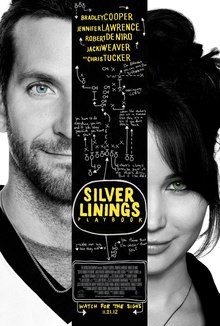Monday, February 18, 2013
Silver Linings Playbook, or How the romantic comedy gets the runaround
Silver Linings Playbook
Written & Directed by: David O. Russell
Starring: Bradley Cooper, Jennifer Lawrence, Chris Tucker, Robert DeNiro & Jacki Weaver.
Oscar Nominations: The Big 8!
Best Editing, Best Adapted Screenplay (David O. Russell), Best Supporting Actor (Robert DeNiro), Best Supporting Actress (Jacki Weaver), Best Actor (Bradley Cooper), Best Actress (Jennifer Lawrence), Best Director (David O. Russell) & Best Picture.
In David O. Russell's Silver Linings Playbook, he has concocted a searing attack on romantic comedies. Or, at the very least, an indictment of both the characters they usually portray and the audiences that flock to them. How else to explain the fact that he makes the leads in this contemporary screwball comedy a pair of -- not to trip over words -- mentally ill characters? While I wonder if there's an interesting argument to be made about medication and mental healthcare in the film -- that aspect seems to disappear inexplicably halfway through the film -- I do think Russell has something to say about what usually see in a romantic comedy. Namely, people who don't function within socially-agreeable and -agreed-upon parameters. Isn't that the suspension of disbelief all romantic comedies require of us? That a lead character (and his audience) believes that if he just gets his shit together he will get his wife back regardless of what he did in a climactic third act (usually something big enough to warrant her scorn if not her outright disgust). Of course, this is where Russell's film begins. We are introduced to Pat Solitano (Cooper) as he attempts to return to 'normalcy' after a stint in a mental institution. He's thinner now than he was before when he assaulted his wife's lover upon finding them sharing a shower, but he's convinced he's better and wants nothing else than to patch up his marriage and find the silver lining in all of this that the title promises. Pat's delusions are presented precisely as that, even as the structure of romantic comedies dictate that he should overcome outward perceptions to win her back (an ending Russell's own film toys with, not without irony, of course).
But Russell's film is more interested in finding for Pat a calming presence (another trope in romantic comedies) and it makes sense that Tiffany (Lawrence) would be just as much of a mess as he is. David noting the Hepburn connection is pretty astute, especially as it betrays the very tropes the film wants to play with: Tiffany is not only a modern screwball protagonist, she is its limit-case. The trick comes when the upended tropes become necessary for the film to move forward. It's no surprise that the third act is as inevitable as it is blandly enjoyable. Ultimately, Russell's game cast can't lift what is a rather (intentionally?) messy film that straightens itself out only to end up where we all knew it eventually would, without much of a payoff. Unless of course, what we're supposed to draw from all of it is that romance is its own kind of anti-depressant? B
Subscribe to:
Post Comments (Atom)


No comments:
Post a Comment